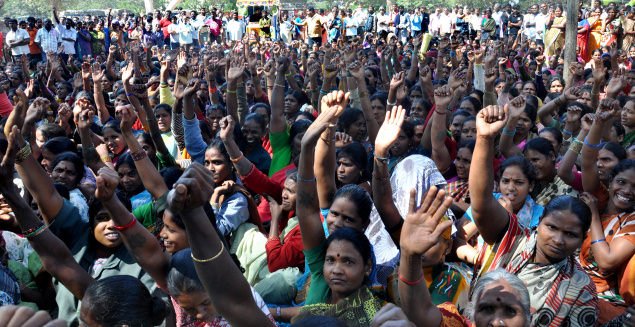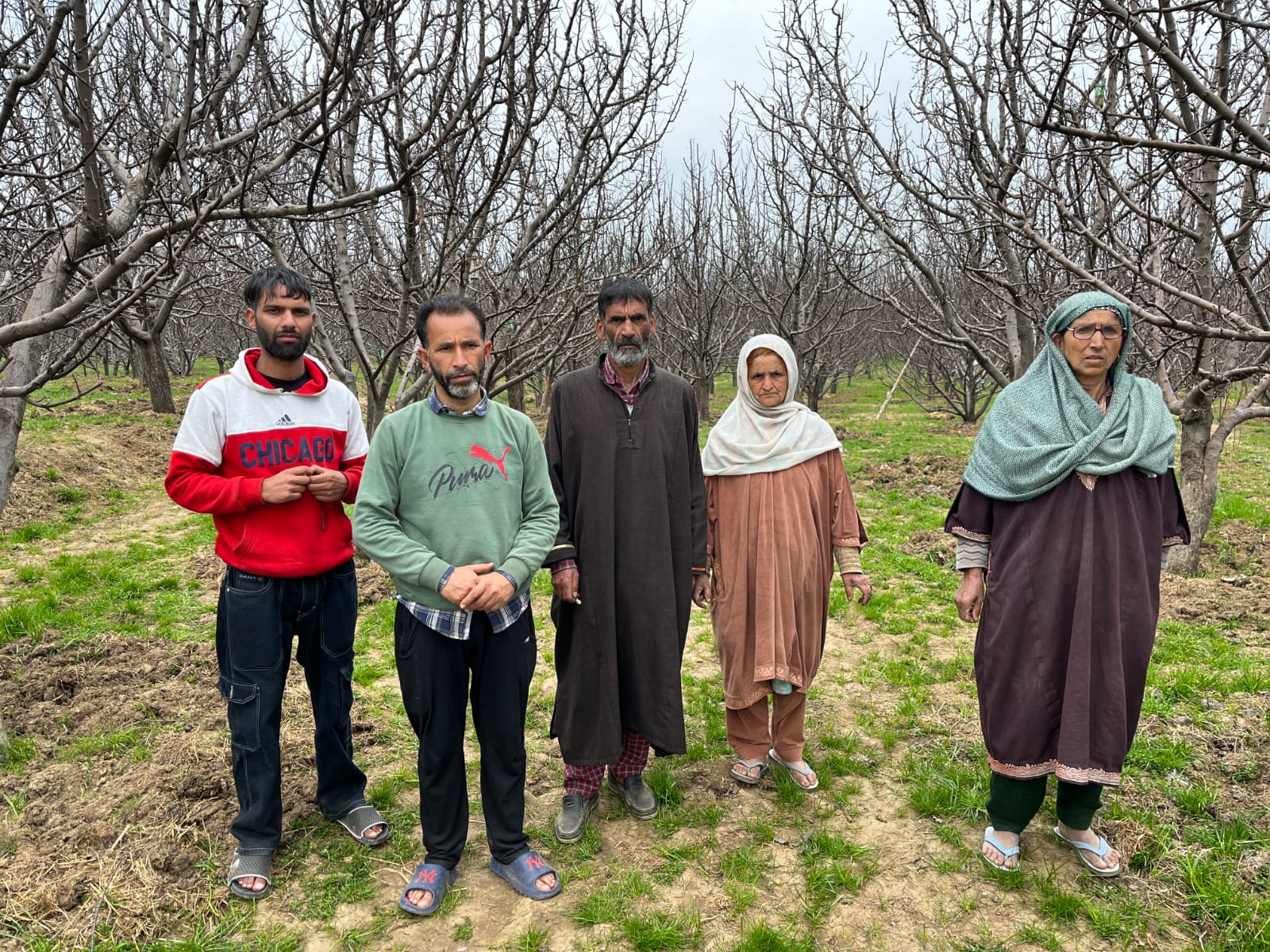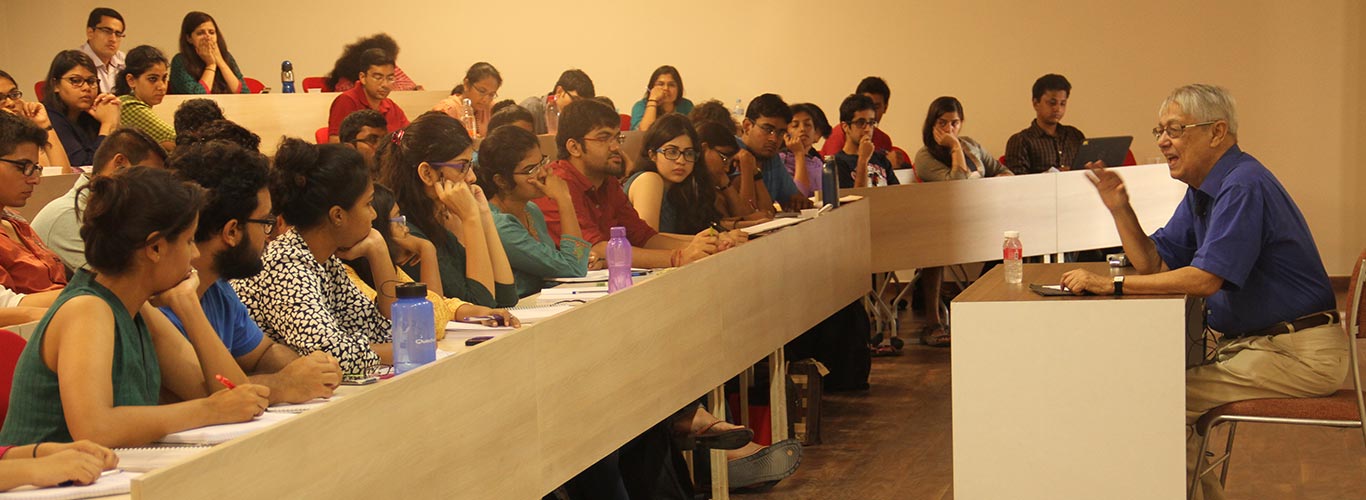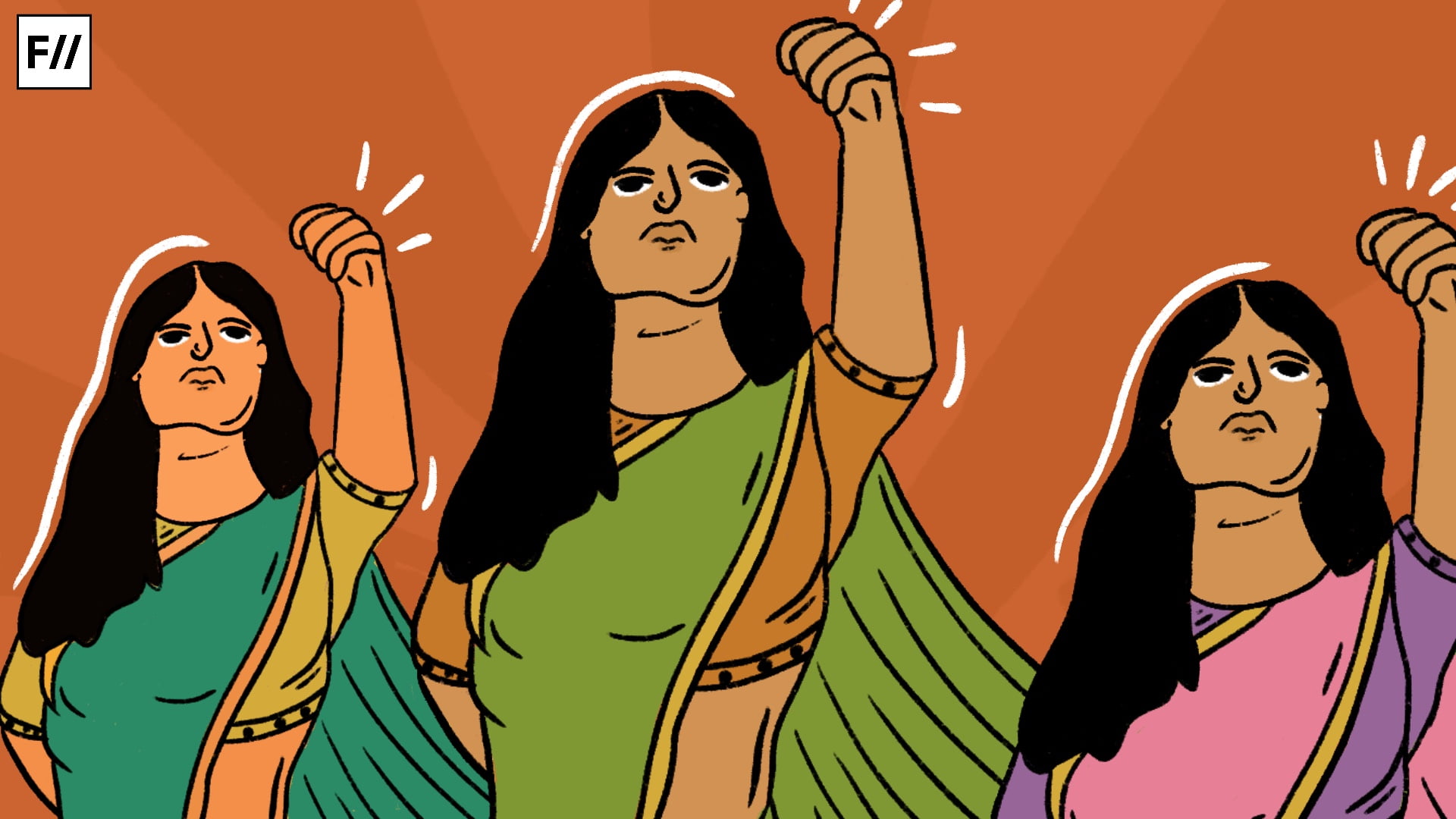Any citizen’s basic need from their city is cleanliness. While the demand seems basic enough, the work that goes into keeping a city clean is not easy. Powrakarmikas work all day, sweeping the streets, picking up garbage and generally keeping the city clean. The work they do is essential for the functioning of the city, yet they aren’t treated with the respect they deserve. After a series of protests, the Powrakarmikas assembled outside the Bruhat Bengaluru Mahanagara Palike (BBMP) office in Bangalore on 8th March 2017 in order to protest the working conditions they face.
There are many problems that the Powrakarmikas face. They have been denied their wages, they do not have suitable gear for the work they do, they do not have proper facilities, and they are sexually, physically and verbally harassed by the contractors they report to.
While there are a few Powrakarmikas who are permanent employees of the BBMP, most of them are engaged on a a daily basis. These contract Powrakarmikas work on a daily wage basis for anything between 5 years and 20 years or more. They report to a contractor who is a middle man. He (as it is in most cases) not only makes sure they work, but also handles their salaries. The contractors are usually men from higher castes, and the Powrakarmikas are mostly Dalit women. The Powrakarmikas are harassed verbally, physically and sexually and are mistreated by the contractors and the general public. Neelima, a Powrakarmika says “If we ask them for better facilities, they ask us how we can ask them these questions and if we have done our jobs well.”
They have been denied their wages, they do not have suitable gear, and they are sexually, physically and verbally harassed by the contractors.
The Powrakarmikas work from 6 am to 1 pm (approximately). They are not givens suitable gear for the backbreaking work they do. They pick up garbage without gloves or masks, drag broken trolleys for their waste-collection drums and often use broken brooms. “They don’t give us water to drink. We have to bring our own brooms. They (the BBMP) are supposed to provide us with brooms but they don’t. If we have no brooms, how do we sweep?” says Lakshmamma. The lack of basic gear is harmful to their health. “We do so much hard work. We have to carry a heavy sack over our shoulder. Tell me, is it easy?”
But the Powrakarmikas’ fight is not just about suitable gear. Up until August 4th 2016, Powrakarmikas were being paid Rs 7730 per month. After many protests and bandhs, the government doubled their salaries and their salaries were revised to Rs 14,040 per month. However, for the past few months, the Powrakarmikas have done their work without receiving their promised salaries. Many of them get Rs 5000-7000 which is below the minimum wage or they are not paid at all. “We haven’t been paid our full wages. We were told our salaries are Rs 14,000 but we never receive all of it. This month we haven’t been paid yet,” says Neelamma.
Yet, they have no choice but to work. If the Powrakarmikas miss a day of work, a part of their salary is cut. Powrakarmikas are not allowed to take days off, including national holidays. If they do miss a day (even if it’s an emergency or a health issue) they are marked absent by their contractor. Sometimes a contractor might harass a Powrakarmika further, making her absent on days that she is present as well.
A study shows that a majority of the Powrakarmikas are Dalits. The history of sanitation in India has long been tied up with the oppression of Dalits, certain groups among which have historically been associated with manual scavenging and sweeping in highly toxic environments. While there is a small percentage of higher-caste Powrakarmikas (3.33%), almost 83% (although some platforms report them to be close to 95%) of the Powrakarmikas are Dalits.
People do not treat them well when they ask for help. The Powrakarmikas work is mainly on the roads, where there is no water supply or toilets for them to use. “We don’t have any facilities for bathrooms. We are not treated well if we ask for help too. We don’t get any holidays. We get food, but it’s inedible. it’s not fit for eating. We eat it only because we’re hungry.”
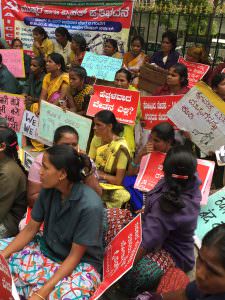
Contract Powrakarmikas Strike in Bangalore. Image Credit: Harini Rajagopalan
The problem that the Powrakarmikas face goes much deeper than the lack of funds. As activist Geeta Menon from Stree Jagruti Samiti puts it, “The whole issues of the Powrakarmikas is not just work related. It is, of course, work related, it is that they’ve been denied their wages, they’ve been denied facilities but it also large much more deeper because this hierarchy exists. This caste hierarchy, where you the work with your hands and there are some people who do work with their heads.”
The issue the Powarakarmikas face is deeply societal. Not only are they mistreated as women, but also as Dalits. It is in situations like these that intersectional feminism becomes important. On International Women’s Day, over a century after its initial conception, women are still fighting for some the most basic rights. To hear these women being denied water, proper food and the wages they were promised is almost like going back a step in the progress of women’s rights. Coupled with the disdain they face as Dalit women reminds us that society hasn’t progressed at all.
Not a message you want to hear on International Women’s day.
The Powrakarmikas had four basic demands of the BBMP:
- To have all the arrears due to them Powrakarmikas paid. The amount due to each Powrakarmika was between Rs. 30,000 and 40,000.
- Regularization of the Powrakarmikas so that they aren’t working on a daily basis but rather as employees.
- One day of the week off and Karnataka state mandated holidays observed
- Direct payment of arrears and future salaries.
The commissioner of the BBMP has agreed to the above terms and the strike has been called off.
